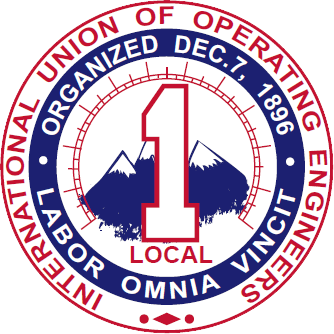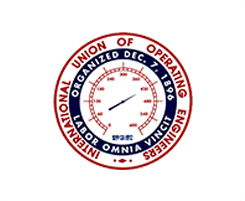A RELIABLE TEAM
Training the next generation of Operating Engineers is the lifeblood of our union. Making sure that Engineers are safe, skilled, and knowledgeable about the equipment they use is our mission
35 Things Your Employer Cannot Do!
Any of the acts listed on the other side of this constitutes a violation. If your employer does any of these things, make a note of it, including names of those involved, time, place, etc., and report such incidents to the union.
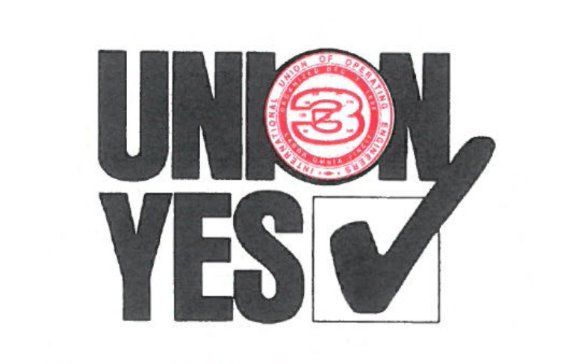
HERE IS THE LAW Your Rights
"SECTION 7. Employees shall have the right to self-organize, to form, join or assist labor organizations, to bargain collectively through representatives of their own choosing, and to engage in other concerted activities for the purpose of collective bargaining or other mutual aid or protection..."
What This Means
- It means that employees have the legal right to help organize, to join and to support a union of their own choosing. This includes such activities as signing a union card, getting others to sign cards, attending union meetings, wearing union buttons, passing out union literature and talking union to other employees.
- It states that employees have the legal right to join together and work as a team in order to help each other.
- It says that employees have the legal right to deal with their employer as a group, rather than individually.
- It gives employees the legal right to take such group action as they feel necessary in order to gain their desired goals so long as these actions violate no other laws.
- It does not mean that employees have the right to carry on union activity during working hours or to allow their union activity to interfere with their jobs. (For this purpose, break time and lunchtime are not considered as working hours.)
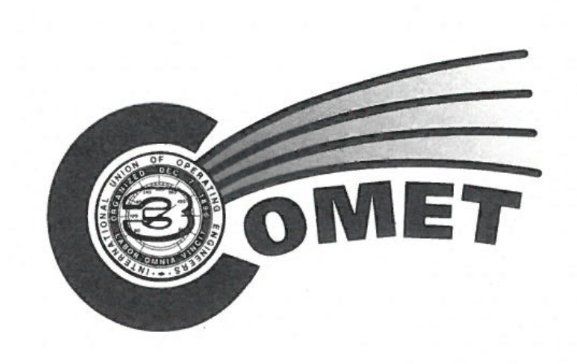
HERE 18 THE LAWYour Protection
"SECTION 8. (a) It shall be an unfair labor practice for an employer-
(1) to interfere with, restrain or coerce employees in the exercise of the rights guaranteed in section 7.
(3) by discrimination in regard to hire or tenure of employment to encourage or discourage membership in any labor organization..."
What This Means
- It means that employees are supposed to have a FREE CHOICE in deciding whether or not they want to use their right to organize. Anything that an employer does to interfere with this free choice is against the law.
- It means that employers who get 'nose trouble' during an organizing campaign are breaking the law. An employer is not supposed to question employees, or even to find out, about how employees feel, who signed cards, which employees are pushing the union, who attended meetings, what went on at meetings, etc. It is none of their business.
- It means that an employer is not supposed to make any promises of raises, promotions or other benefits in order to influence employees in the exercise of their rights.
- It means that an employer cannot take away, or threaten to take away, any benefits which you already have because of your union activity.
- It means that it is illegal for an employer to penalize an employee in any manner because of his union activity or belief. This includes such things as cutting out overtime, transferring to a less desirable job, suspension or discharge. (If an employer does any other these things, and it is proven that it was done because of union activity, he/she must reinstate the employee to his former position without loss of seniority and pay him for all lost wages, plus interest.)
It is unlawful for your employer, supervisor or foreman to interfere with, restrain or coerce employees seeking to organize or join a union. Any of the acts listed below constitutes a violation of the National Labor Relations Act, as Amended.
- Attend any union meeting, park across the street from the hall or engage in any undercover activity which would indicate that the employees are being kept under surveillance to determine who is and who is not participating in the union program;
- Tell employees that the company will fire or punish them if they engage in union activity;
- Lay off, discharge, discipline any employee for union activity;
- Grant employees wage increases, special concessions or benefits in order to keep the union out;
- Bar employee-union representatives from soliciting employees' memberships on or off the company property during non-working hours;
- Ask employees about union matters, meetings, etc. (Some employees may, of their own accord, walk up and tell of such matters. It is not an unfair labor practice to listen, but to ask questions to obtain additional information is illegal.);
- Ask employees what they think about the union or a union representative once the employee refuses to discuss it;
- Ask employees how they intend to vote;
- Threaten employees with reprisal for participating in union activities. For example, threaten to move the plant or close the business. curtail operations or reduce employees' benefits:
- Promise benefits to employees if they reject the union;
- Give financial support or other assistance to a union;
- Announce that the company will not deal with the union;
- Threaten to close, in fact close, or move plant in order to avoid dealing with a union;
- Ask employees whether or not they belong to a union, or have signed up for union representation;
- Ask an employee, during the hiring interview, about his affiliation with a labor organization or how he/she feels about unions;
- Make anti-union statements or act in a way that might show preference for a non-union person;
- Make distinctions between union and nonunion employees when assigning overtime work or desirable work;
- Purposely team up non-union people and keep them apart from those supporting the union;
- Transfer workers on the basis of union affiliations or activities;
- Choose employees to be laid off in order to weaken the union's strength or discourage membership in the union;
- Discriminate against union people when disciplining employees;
- By nature of work assignments, create conditions intended to get rid of an employee because of his union activity;
- Fail to grant a scheduled benefit or wage increase because of union activity;
- Deviate from company policy for the purpose of getting rid of a union supporter;
- Take action that adversely affects an employee's job or pay rate because of union activity;
- Threaten workers or coerce them in an attempt to influence their vote;
- Threaten a union member through a third party;
- Promise employees a reward or a future benefit if they decide "no union";
- Tell employees overtime work (and premium pay) will be discontinued if the plant is unionized;
- Say unionization will force the company to lay off employees;
- Say unionization will do away with vacations or other benefits and privileges presently in effect;
- Promise employees promotions, raises or other benefits if they get out of the union or refrain from joining the union;
- Start a petition or circular against the union or encourage or take part in its circulation if started by employees;
- Urge employees to try to induce others to oppose the union or keep out of it;
- Visit the homes of employees to urge them to reject the union.
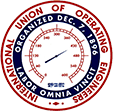
Top 6 reasons to Join the Union
WHY JOIN A UNION?
All our members get an equal opportunity to fair wages, health care, pension and good working conditions. All this is negotiated on your behalf by Local 1. Statistically Union workers receive higher wages and better benefits than Non-Union. In most cases we negotiate health and welfare in our contracts which is paid in full by the company. Most of the time by the company utilizing our insurance we are able to save them money. Our pension which is also negotiated is second to none. Which gives you a defined benefit instead of a 401k. This gives you guaranteed money when you retire. But one of the most important parts is that you will have a voice. Ask yourself this question. Has your employer made changes to any of your working conditions, pay, health care or anything else? Did you have a say in the matter? There is a high chance the answer is no; you didn’t have a say. With a Union you do! You get to decide what you want to change if anything.
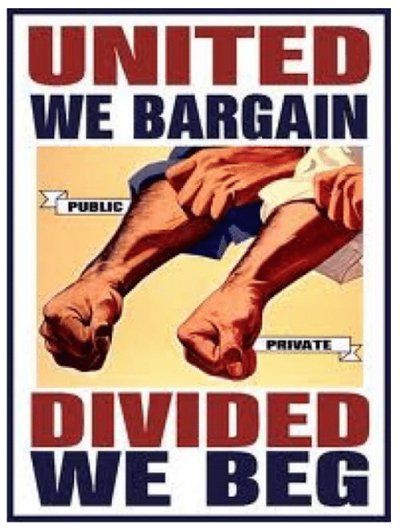
OPERATING ENGINEERS LOCAL 1
What are you paying for Health Care each Month?
On average non-members are paying $550 for employee plus spouse per month, family health care is even more. This equals out to $3.17 per hour. What we have also found is that most plans are very high deductible, and to get dental and vision is an additional cost. It's crazy how expensive health care has become.
On average our members are paying less than $50 a month, this is a family plan. In most of our contracts our members pay $0. Which puts more money in your pocket? Also our plan includes vision, dental, and life insurance, with a low deductible of $200.
Monthly to hourly cost examples;
$200 per month = $1.15 per hour
$400 per month = $2.31 per hour
$600 per month = $3.46 per hour
Figure your monthly cost divided by 173.3 which is average hours worked in a month. This will give you your hourly cost of insurance. This money could be put back in your pocket.
This is just a small glimpse of our health care, there is so much more. For more info on the benefits please give us a call.
What is the Central Pension Fund?
- The 4th largest pension fund in the United States with assets in excess of 6 billion.
- It was established in 1960 by the International Union of Operating Engineers and union employers nationwide.
- It receives contributions from union employers at more than 8,000 locations Nation Wide.
- It has more than 150,000 active participants and pensioners.
- Its benefits are fully funded and it has never had any withdrawal liability for contributing employers.
- Its benefits are insured to statutory limit by the U.S. pension benefit guaranty corporation.
401k VS Central Pension Fund
401k contributions come from you the worker which are sometimes matched up to a certain percentage.
The pension contributions come from the employer only. This means more money is going into your pocket.
Vesting credit for time served at the company. So if you have been with the company 5 years or more you will already be vested.

As a worker, you have rights under Federal Law to form or join a Union. You have the right to select representatives of your choice and bargain collectively with your employer.
Belonging to a Union gives you rights under law that you do not have as an individual. Once you have successfully formed a Union, your employer must bargain over wages, hours, working condition, and more. Even though the law protects your rights to receive information regarding organizing your workplace, the union will keep confidential your request for that information as well as any information you give the Union. To explore the possibility of Union representation in your work place, it is necessary to discuss it with your co-workers and the Union. A majority of employees in your department must agree to join, for Union representation to be successful. After that is determined then authorization cards are distributed for signatures. To discuss further details please contact us.
Also please ask for our 35 things your employer cannot do!
Its Against the Law
For Your Employer to Spit on You!
It’s your legal right
to organize a union. The law says:
Employees shall have the right to self-organize, to form, join, or assist labor organizations, to bargain collectively through representatives of their own choosing, and to engage in other concerted activities for the purpose of collective bargaining or other mutual aid or protection. National Labor Relations Act, 1935
While workers are building a union on their job, it is common for employers to violate their rights. These violations are called “unfair labor practices.”A general rule to remember is that it is illegal for an employer to:
Spy It is illegal for your boss to spy on workers’ union activities
Promise
It is against the law for your boss to promise you rewards of better benefits, promotions or superior working conditions in exchange for stopping union activities.
Interrogate It is illegal for your boss to interrogate or question you about your union activities or your support for the union.
Threaten It is against the law for your boss to make threats concerning your employment, wages, hours or working conditions because of union activity.
